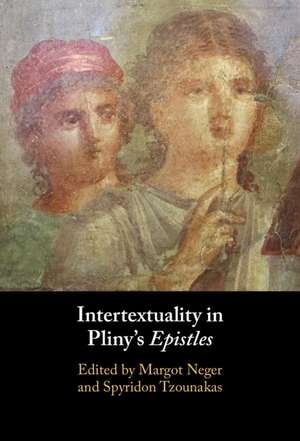Intertextuality in Pliny's Epistles
Editat de Margot Neger, Spyridon Tzounakasen Limba Engleză Hardback – 29 sep 2023
Preț: 593.87 lei
Preț vechi: 652.61 lei
-9% Nou
Puncte Express: 891
Preț estimativ în valută:
113.63€ • 118.64$ • 94.05£
113.63€ • 118.64$ • 94.05£
Carte disponibilă
Livrare economică 14-28 martie
Livrare express 27 februarie-05 martie pentru 37.30 lei
Preluare comenzi: 021 569.72.76
Specificații
ISBN-13: 9781009294768
ISBN-10: 1009294768
Pagini: 348
Dimensiuni: 237 x 159 x 27 mm
Greutate: 0.64 kg
Editura: Cambridge University Press
Colecția Cambridge University Press
Locul publicării:Cambridge, United Kingdom
ISBN-10: 1009294768
Pagini: 348
Dimensiuni: 237 x 159 x 27 mm
Greutate: 0.64 kg
Editura: Cambridge University Press
Colecția Cambridge University Press
Locul publicării:Cambridge, United Kingdom
Cuprins
Introduction Margot Neger and Spyridon Tzounakas; Part I. Intertextuality and Interdiscursivity in Pliny's Letters: 1. Pliny, Man of Many Parts (Lucretius, Cicero, Valerius Maximus, Tacitus) Christopher Whitton; 2. Intertextuality in Pliny Epistles 6 Roy Gibson; 3. Discourses of Authority in Pliny, Epistles 10 Alice König; Part II. Models and Anti-Models: Pliny's Interaction with Oratory and Natural History; 4. Oratorical Speeches and the Political Elite in the Regulus Cycle Matthew Mordue; 5. Again on Corinthian Bronzes and Vases and on the Use of Cicero's Verrine Orations in Pliny's Works Stefano Rocchi; 6. The Elder Pliny as source of inspiration: Pliny the Younger's reception of the Naturalis Historia and his uncle's writing by the light of a lamp (lucubratio) Judith Hindermann; Part III. Pliny and Seneca: Discourses of Grief and Posthumous Reputation; 7. Pliny's Seneca and the Intertextuality of Grief Michael Hanaghan; 8. Intertextuality and Posthumous Reputation in Pliny's Letter on the Death of Silius Italicus (Plin. Ep. 3.7) Spyridon Tzounakas; Part IV. Pliny's Villas and their Poetic Models: 9. The Villa and the Monument: Horace in Plin. Ep. 1.3 Alberto Canobbio; 10. The Villas of Pliny and Statius Christopher Chinn; Part V. Pliny Turns Nasty: Satire and the Scoptic Tradition; 11. A Busy Day in Rome: Pliny Ep. 1.9 Satirized by Horace Sat. 1.9 Ábel Tamás; 12. Putting Pallas out of Context: Pliny on the Roman Senate voting Honours to a Freedman (Ep. 7.29 and 8.6) Jakub Pigoń; 13. Risus et indignatio: Scoptic Elements in Pliny's Letters Margot Neger; Part VI. Final Thoughts: Discourses of Representation and Reproduction; 14. Pliny's Calpurnia: Filiation, Imitation, Allusion Ilaria Marchesi.
Descriere
Focusing on intertextuality, this book investigates Pliny the Younger's engagement with other authors and genres in his Epistles.
